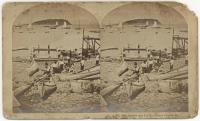Many Wabanaki men at the Bar Harbor encampments made themselves available as guides to take summer people in canoes for sightseeing, fishing, or hunting including Penobscots Frank “Big Thunder” Loring, Joe Francis, Mitchell Francis, and Newell Mitchell, along with Passamaquoddies Wallace Lewey and Joe Mell.
Louis Mitchell of the Passamaquoddy tribe of Indians will have during the season, at the shore between Suminsby’s and Steamboat Wharf, Bar Harbor, a number of Birch-bark canoes, in which he will take parties to several Islands in the bay and around Mount Desert Island. Carrying sporting parties to places where porpoise and seal may be shot. Guns and ammunition furnished when desired. Reliable and experienced paddlers will be provided. -Mount Desert Herald, July 1881
Stories of Wabanaki canoe feats abounded, such as the time Louis Mitchell paddled all the way around Mount Desert Island – 60 miles in 12 hours. Or the time a steamship captain saw an Indian wildly signaling him from a canoe out of sight of land, Assuming he was in trouble, the captain stopped his ship, only to find that the Passamaquoddy paddler simply wanted matches to light his pipe. In short, as one local put it, “A birch canoe was a good boat if there was an Indian in it.”
In the 1880s, hunting guides could be hired for $1.50-$2.50 a day. Some mentioned the fee in their ads; others did not. Joe Mell’s 1883 Mount Desert Herald ad read: “Fall hunting in Maine. Parties wishing to Hunt or Camp in Maine can secure an Excellent Guide by addressing Joe Pierpoll, Princeton, Maine, the best Indian guide in the Schoodic waters. Two nice canoes and good accommodations for six persons. Will warrant that good deer hunting be found.”
One man who answered Joe’s ad was William Lyman Underwood, grandson to William Underwood who established the Underwood Canning Company in Boston around 1825. In 1880 young William set up a fish cannery in Southwest Harbor and oversaw the operation for two decades. Beginning in 1883, he and Joe ventured into the woods together every spring and fall for forty years. In his book Wilderness Adventures, William said this about Joe: “There is no better guide for the woods than a man who has lived and been brought up there, as has Joe. . . . Nothing escapes Joe’s keen eyes. His power of sight, especially the knack of finding things, is nothing short of marvelous.”

Canoeing at Bar Harbor, 1886
Abbe Museum
Canoe Club
Boasting as many as 300 members, the Mount Desert Island Canoe Club encouraged “cooing, wooing, and canoeing,” as well as serious training in the “fine art of paddling.” Most members this rusticators’ club aspired to having their own Indian-made paddle and birchbark canoe, and many turned to proven experts from the Indian encampment for instruction. Rusticators took great pleasure in seeing Wabanaki paddling skills displayed at the Club’s annual canoe races.
Continue to Wabanaki Today


 Passamaquoddy hunting guide Joe Mell, ca. 1895. Photo by William Lyman Underwood.
Passamaquoddy hunting guide Joe Mell, ca. 1895. Photo by William Lyman Underwood.